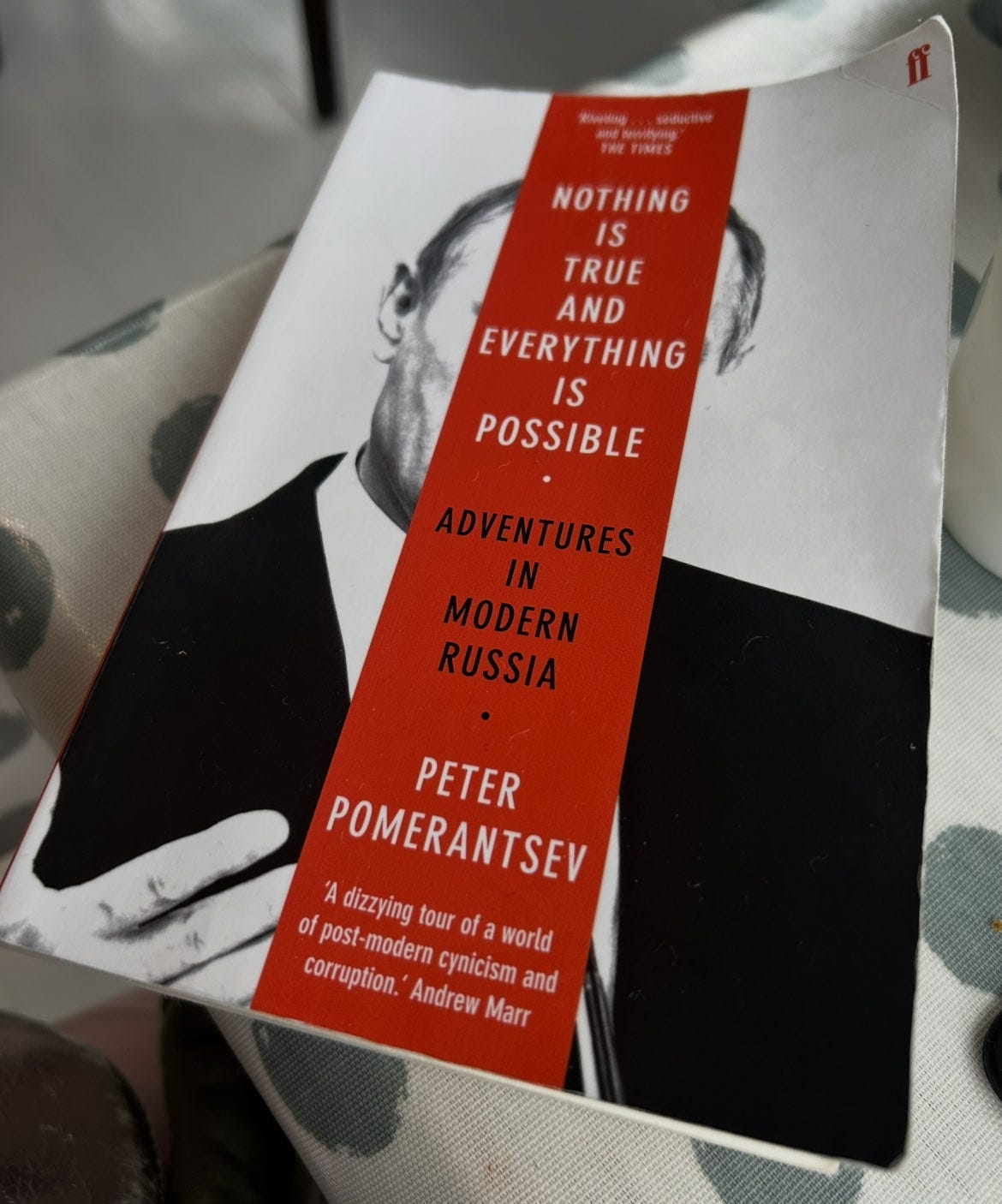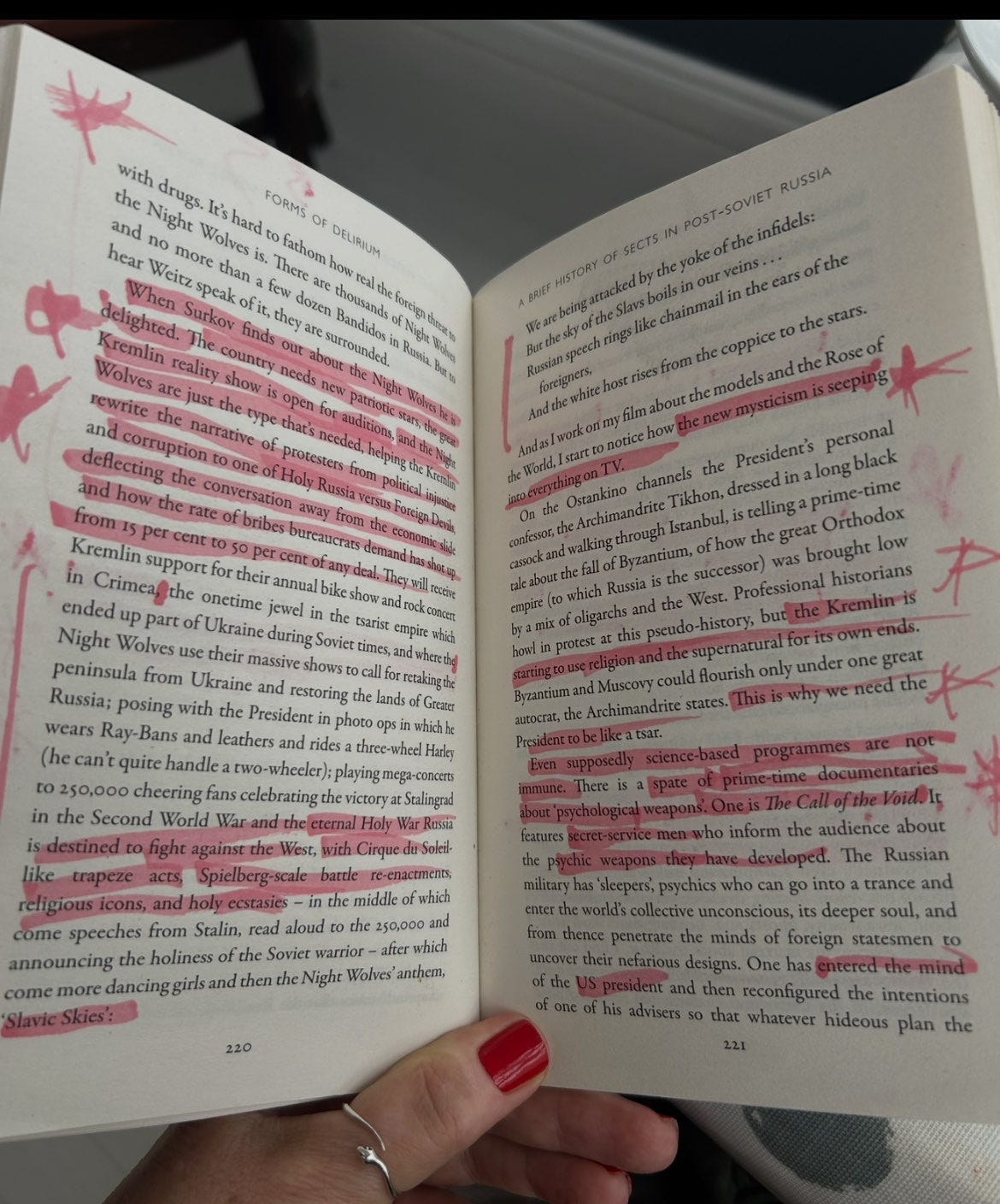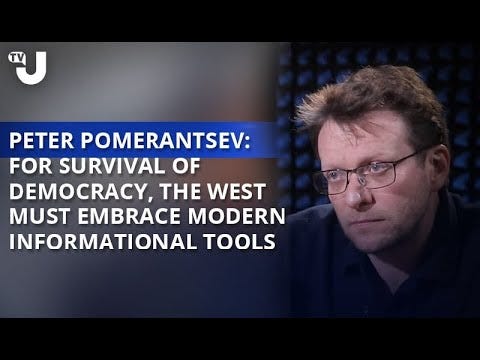RECONSTRUCTING REALITY: Disrupting Russia’s Dark Carnival
In this report on ‘Nothing Is True and Everything Is Possible’ by Peter Pomerantsev, we see how Russia uses propaganda to destroy reality and how there’s still time reconstruct it to save the world
***Please take out a membership to support the light of truth.***
The gold-diggers are fatherless girls in a nouveau riche Russia. ‘Over the hill’ by 22, they learn the trade early from the vast how-to-gold-dig industry.
In dazzling TV studios bathed in glam lighting, the propagandists are like a Greek chorus smothered in horseshit and sparkling sequence, always warning viewers how the West is out to get them. The West, a term that is almost meaningless in an era where ‘the West’ was lost to Reality TV fascism.
In Russia, the Kremlin has a kung fu grip on media, who treat reality like a rotting corpse, trotting it out on rare occasions but constantly subverting it with fiction tailored to benefit Vladimir Putin.
It’s in the stunning churning madness of Moscow in the oily aughts that Peter Pomerantsev finds himself in the center of the media maelstrom. His 2015 book, revised in 2017 — Nothing Is True and Everything Is Possible: Adventures In Modern Russia — offers a blueprint for the fascist dystopia that’s now leaching into democratic nations.
Pomerantsev writes:
“With no idea of the future left, facts become unnecessary. They are, after all, unpleasant things, reminders of one’s mortality and limitations… The process occurred in Russia harder and faster because cynicism and disillusionment set in earlier… everything turned into a dark carnival more rapidly. The Russian president turned politics into a reality show, remaking authoritarianism with the logic of twenty-first century entertainment.”
The blinking lights Pomerantsev monitors offer us a warning. There’s still time to save Europe and disrupt the US during its descent into post-truth horror, a prefab dark carnival led by a reality tv star, ‘substituting politics with the logic of entertainment.’
Nothing Is True gives us a ringside seat on how an authoritarian state is created using television, and alternately how the television can and must be smashed into a million tiny pieces.
Pomerantsev was born in the UK to dissident parents from Russia. He spent almost a decade in Moscow creating reality shows and documentary films, and when he arrived, Moscow was paved with oil and stilettos.
Pomertantsev is a brilliant writer, and his ability to paint vivid pictures with words is nothing short of dazzling.
He describes the Moscow architecture of nineteenth century mini mansions as leaning ‘on each other like happy drunk friends singing on their way home to a warm bed.’
“I have learned to pick things up on the edge of a hint,” he writes, of refining his radar on indirect communication.
He brought his camera everywhere, a battered metal Sony Z1.
“I just filmed so as not to let this world escape; I shot blindly, knowing I would never have a cast like this again,” he writes.
He doesn’t pull punches on the central thesis of his book: that Russia’s ‘glittering masquerade’ is delivered through media by the ‘battering ram of Kremlin propaganda’ — a ‘society of simulation’ — where politics is performance art and everything is PR. The promise of ‘stability’ was always cover for the intended fascist mafia state run by the bandits from St. Petersburg.
He tells the story of a woman running a legitimate business, who was picked up and thrown in prison for seven months — charges manufactured in a shakedown scheme known as ‘state raiding,’ where anyone’s business can be co-opted by goons of the state looking for a payoff or to take what belongs to others.
She was hit with charges on a new ‘law’ retroactively, and only because she became a cause celebre and could afford a gutsy lawyer did she secure her release while other innocents languished.
Pomerantsev describes Moscow as a city ‘living in fast forward, changing so fast it breaks all sense of reality’ — everything remade to suit the simulation — buildings, people, political parties — all manufactured.
“Moscow was a sad satellite at the edge of Europe, emitting the dying embers of the Soviet empire. Then… money,” he writes of the oil boom.
Quickly, the media became a synthesis of ‘Soviet control with Western entertainment.’ News was the ‘incense’ that Putin was blessed with as he played his roles — ‘soldier, lover, bare-chested hunter, businessman, spy, tsar, superman.’ Reality became malleable, as ‘Kremlin friendly cults and hate-mongers were put in primetime to keep the nations entranced, distracted’ and ‘foreign hirelings’ arrived to spread the Kremlin’s vision to the world.
“As the Kremlin became more paranoid… the need to incite panic and fear ever more urgent.”—Peter Pomerantsev
Bright, shiny TV became ‘subversive pop art, a way to climb into the nation’s psyche and rewire it from the inside.’
The primary puppeteer of this simulation is Vladislav Surkov, the political technologist who deconstructed reality so Putin could consolidate all power and Russia ‘can feel like an oligarchy in the morning, a democracy in the afternoon, a monarchy for dinner and a totalitarian state by bedtime.’
“‘Performance’ was the city’s buzzword,” Pomerantsev writes, “a world where gangsters become artists, gold diggers quote Pushkin, Hells Angels hallucinate themselves as saints. Russia had seen so many worlds flick through in such blistering progression—from communism to perestroika to shock therapy to penury to oligarchy to mafia state to mega-rich—that its new heroes were left with the sense that life is just one glittering masquerade, where every role and any position or belief is mutable… It was only years later that I came to see these endless mutations not as freedom but as forms of delirium, in which scare-puppets and nightmare mystics become convinced they’re almost real and march toward what the President’s vizier would go on to call the ‘the fifth world war, the first non-linear war of all against all.’”
‘Sleazy glitz’ offered the perfect distraction from reality, ‘the cash has come so fast, like glitter shaken in a snow globe, that it feels totally unreal.’ Foreign academics come to help democracy along, only to find out there is no interest in democracy, just more simulation, a country in transition to some sort of ‘postmodern dictatorship that uses the language and institutions of democratic capitalism for authoritarian ends.’
A model who spent time on Epstein’s island and in one of Russia’s cults commits suicide. Another model who spent time in the same cult also kills herself. The cults described sound like prototypes for QAnon, the cult that created the J6 foot soldiers and that always had a shirtless Putin and a yoked Trump in the role of hero.
There is something rotten in the heart of Russia, and the TV producers know this, but they delude themselves that it doesn’t matter.
Here, Pomerantsev explains the inner workings of one of the networks:
“The producers who work at the Ostankino channels might all be liberals in their private lives, holiday in Tuscany, and be completely European in their tastes. When I ask how they marry their professional and personal lives, they look at me as if I were a fool and answer: ‘Over the last twenty years we’ve lived through a communism we never believed in, democracy and defaults and mafia state and oligarchy, and we’ve realized they are illusions, that everything is PR.’
“‘Everything is PR’ has become the favorite phrase of the new Russia; my Moscow peers are filled with a sense that they are both cynical and enlightened. When I ask them about Soviet-era dissidents, like my parents who fought against communism, they dismiss them as naïve dreamers and my own Western attachment to such vague notions as ‘human rights’ and ‘freedom’ as a blunder. ‘Can’t you see your own governments are just as bad as ours?’ they ask me.
“I try to protest—but they just smile and pity me. To believe in something and stand by it in this world is derided, the ability to be a shape-shifter celebrated. Vladimir Nabokov once described a species of butterfly that at an early stage in its development had to learn how to change colors to hide from predators. The butterfly’s predators had long died off, but still it changed its colors from the sheer pleasure of transformation. Something similar has happened to the Russian elites: during the Soviet period they learned to dissimulate in order to survive; now there is no need to constantly change their colors, but they continue to do so out of a sort of dark joy, conformism raised to the level of aesthetic act.”
And as truth becomes choked off, voices call out from the grave. Murdered journalists and dead lawyers are not shown on shiny TV, but jailed businessmen and women are — their cages drab with poor lighting as good lighting is reserved for the very tanned propagandists.
Throughout the book I feel a kinship with Pomerantsev, while he was producing news in Moscow, I was a producing news in Los Angeles. It was never dull, and I quit in protest before delusion sank my soul.
By the time the delirium bubble bursts and people are protesting in the streets of Moscow, with the simple but poignant slogan, ‘Don’t Lie, Don’t Steal,’ it’s already too late.
They are stuck with the gangster from St. Petersburg, who oversees a lawless post-truth fiefdom, a ‘whole culture of simulation.’
In 2010, Pomerantsev returns to the UK after failing to produce reality programming that resembles reality — forced to leave truth on the cutting room floor in a push for ‘positive’ stories. He documents how Russian money is infecting London.
I presume I don’t need to tell you how Russian money infected the US, and with it, the demolition of moral compasses and absolute truths.
Under Putin and Trump, even worship becomes performative, as faith leaders praise sadistic felons. In Russia, the Orthodox church is run by the KGB. In America, Trumpist ‘faith’ leaders are run by the oil industry.
In order to reconstruct reality, we have got to turn off the fucking television. Trump barely exists outside of the screen. Like Putin, his power is derived from cameras.
Western civilization is ever fragile.
****
Author’s note: A special thank you to my friend Marci Shore for reminding me to read this book.
Learn more about Nothing Is True and Everything Is Possible here.
****
Related:
****
Bette Dangerous is a reader-funded magazine. Thank you to all monthly, annual, and founding members.
I expose the corruption of billionaire fascists, while relying on memberships for support.
Thank you in advance for considering the following:
Share my reporting with allies
Buying my ebooks
A private link to an annual membership discount for older adults, those on fixed incomes or drawing disability, as well as activists and members of the media is available upon request at bettedangerous/gmail. 🥹
More info about Bette Dangerous - This magazine is written by Heidi Siegmund Cuda, an Emmy-award winning investigative reporter/producer, author, and veteran music and nightlife columnist. She is the cohost of RADICALIZED Truth Survives, an investigative show about disinformation and is part of the Byline Media team. Thank you for your support of independent investigative journalism.
🤍
Begin each day with a grateful heart.
🤍








Thank you for this, Heidi. There many are gems of wisdom in this piece, along with Pomerantsev's chillingly vivid descriptions of Putin's post-truth dystopia, where 'nothing is true and everything is possible', 'PR is everything', and 'everything is a simulation'. The parallels with Trump's Amerika are impossible to deny. "The Russian president turned politics into a reality show, remaking authoritarianism with the logic of twenty-first century entertainment.”
This is exactly what Trump and his propaganda entertainment TV 'nooze' media, Fox, has done on a daily basis. And it all started with Mark Burnett creating the fake 'successful businessman' persona for Trump on 'The Apprentice', which people mistook for the reality of the 6-times bankrupted con man, and that Trump continued to play-act in the real world of US politics. Even he seems to have drunk his own Kool-Aid, as much as his MAGA base.
With Trump and his regime of terror, hell-bent on destroying everything that gives us hope for a humane and livable future, we are not so far from slipping into the fascist post-truth dystopia of Russia that he describes: “With no idea of the future left, facts become unnecessary."
But I have more faith in most of my fellow Americans than to abandon hope. We are not Russia. More and more people are finally waking up to the Trump regime's destructive and evil agenda and to the grave danger that we face. So, I am very thankful for independent media, such as yours, and the precious insights it provides. And I take heart in these words:
"The blinking lights Pomerantsev monitors offer us a warning. There’s still time to save Europe and disrupt the US during its descent into post-truth horror, a prefab dark carnival led by a reality tv star, ‘substituting politics with the logic of entertainment.’
Nothing Is True gives us a ringside seat on how an authoritarian state is created using television, and alternately how the television can and must be smashed into a million tiny pieces."
We must not allow 'Reality TV' to define our reality. Turn off the 'slime oozing out of your TV' set, as Frank Zappa sang about decades ago in his famous tune, "I am the Slime". When we get out in Nature, when we get out into our communities and talk to our neighbors, experience live, original music, and when we read more books and great independent journalism, literature and the arts, this false TV reality melts away. And the propagandists stand naked, their lies and false facade, exposed. We can do this! And we must.